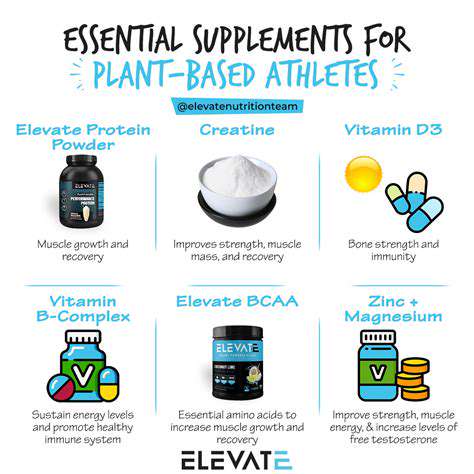Top 10 Anti Aging Foods to Add to Your Diet
Fatty Fish: Omega-3s for Cellular Protection
Benefits of Omega-3s for Cellular Health
Fatty fish delivers omega-3 fatty acids that serve as fundamental building blocks for cellular membranes, directly supporting the body's natural anti-aging mechanisms. These essential nutrients enhance membrane flexibility, enabling efficient nutrient absorption and waste elimination at the cellular level. The improved cellular communication facilitated by omega-3s promotes optimal functioning throughout the body while potentially decelerating age-related decline. Additionally, these fatty acids play a significant role in moderating inflammatory responses, which are closely tied to cellular deterioration and premature aging. Regular consumption of fatty fish supplies these critical nutrients, fostering a robust cellular environment conducive to longevity.
Omega-3 fatty acids also stimulate the creation of specialized signaling molecules called eicosanoids. When derived from omega-3 sources, these molecules exhibit potent anti-inflammatory characteristics that may counteract oxidative stress and minimize harm to cellular components. By enhancing cellular efficiency and reducing inflammation, omega-3s contribute to maintaining cellular youthfulness and resilience, potentially slowing the aging process while supporting comprehensive health improvements.
Fatty Fish and Skin Health
The benefits of fatty fish extend visibly to skin health, where omega-3s demonstrate remarkable effects. These essential fats play a pivotal role in preserving skin suppleness and moisture levels, combating dryness and promoting a vibrant, youthful appearance. The inflammation-reducing properties of omega-3s can alleviate skin irritations while diminishing the visibility of age-related lines and creases. Consistent inclusion of fatty fish in one's diet strengthens the skin's protective barrier, defending against environmental aggressors and encouraging a more luminous complexion. This protective effect includes reducing inflammatory responses, a common contributor to skin aging and various dermatological concerns.
The abundant essential fatty acids in fatty fish play an instrumental role in maintaining optimal skin hydration. This moisture retention, combined with the anti-inflammatory benefits of omega-3s, can substantially improve skin texture by minimizing wrinkle appearance and promoting a healthy, radiant glow. Fatty fish therefore offer dual benefits - supporting internal cellular health while simultaneously enhancing external appearance, making them a formidable ally against visible signs of aging.
Through their support of collagen generation and skin moisture maintenance, omega-3s from fatty fish contribute to developing a more elastic and durable skin structure. This results in reduced visibility of fine lines and wrinkles, contributing to a fresher, more vibrant facial appearance. The anti-inflammatory action of these beneficial fats further promotes skin wellness, potentially decreasing redness and irritation for a more even, healthier skin tone.
Citrus Fruits: Vitamin C for Radiant Skin
Citrus Fruits: A Vitamin C Powerhouse
Citrus varieties including oranges, lemons, grapefruits, and limes are celebrated for their exceptional vitamin C concentrations. This powerful antioxidant serves as a critical component in collagen formation, the structural protein responsible for maintaining firm, elastic skin. Vitamin C safeguards collagen from free radical assault, thereby supporting skin elasticity and reducing the appearance of aging markers. Incorporating citrus fruits into regular dietary patterns can make a noticeable difference in achieving a healthy, glowing complexion.
Beyond their dermatological advantages, citrus fruits offer numerous systemic benefits. They contain an array of antioxidants that combat cellular damage while supporting general wellness. Their vibrant hues not only please the eye but frequently indicate the presence of beneficial plant compounds that further enhance bodily health and vitality. Including diverse citrus varieties in one's eating plan provides a simple yet effective method to increase essential nutrient consumption.
Collagen Boost for Youthful Skin
Collagen serves as the foundational protein that provides structural integrity to skin tissue. As part of the natural aging process, collagen production gradually diminishes, leading to reduced skin elasticity and increased wrinkle formation. The abundant vitamin C found in citrus fruits plays an indispensable role in collagen synthesis. It facilitates the body's production of new collagen fibers, essential for maintaining firm, youthful-looking skin.
Protecting Against Free Radical Damage
Free radicals represent unstable molecules capable of damaging healthy cells throughout the body, including skin cells. This oxidative stress can accelerate aging processes and promote wrinkle development. Vitamin C functions as a potent antioxidant, neutralizing these harmful molecules and shielding skin from their damaging effects. This protective mechanism explains why citrus fruits are particularly valuable for preserving youthful skin characteristics.
Beyond Vitamin C: Other Essential Nutrients
While vitamin C dominates the nutritional profile, citrus fruits provide additional valuable nutrients. They contain various B-complex vitamins, essential for energy metabolism and overall health maintenance. Citrus fruits also serve as good potassium sources, an electrolyte that helps regulate cardiovascular function. This nutrient combination makes citrus fruits a worthwhile addition to any balanced diet.
Simple Ways to Incorporate Citrus into Your Diet
Citrus fruits offer versatile culinary applications that make them easy to include in daily eating patterns. They can be juiced over breakfast cereals, added to fresh salads, or enjoyed as portable snacks. Refreshing citrus-infused waters or freshly prepared juices provide convenient methods to boost vitamin C consumption throughout the day.
Citrus Fruits and Skin Health: A Synergistic Relationship
The relationship between citrus fruits and skin health extends beyond simple vitamin C content. The combined antioxidant and nutrient profile of these fruits contributes holistically to skin wellness. A diet rich in citrus varieties supplies the body with essential components for maintaining healthy skin, promoting a radiant and youthful appearance. Regular consumption supports natural skin renewal processes from within.
A Delicious and Healthy Choice for Radiant Skin
Citrus fruits represent a flavorful and practical method to increase vitamin C intake while supporting healthy, glowing skin. Their bright flavors and refreshing qualities make them enjoyable dietary additions. By regularly including citrus fruits in meals, individuals can actively contribute to maintaining youthful skin characteristics while supporting overall health. The combined sensory pleasure and health benefits make citrus consumption a rewarding practice - your skin will reflect the difference!

Avocados: Healthy Fats for Skin and Cellular Function
Avocado's Role in Healthy Skin
Avocados provide an exceptional source of beneficial monounsaturated fats, which play a fundamental role in maintaining skin health. These healthy fats help moisturize skin tissue, preventing dryness and flakiness while enhancing suppleness. They reinforce the skin's protective barrier, defending against environmental damage. The vitamin and antioxidant composition of avocados stimulates collagen production, crucial for preserving skin elasticity and preventing premature aging signs. Regular avocado consumption can significantly improve skin radiance and youthfulness.
Beyond basic hydration, avocado fats help balance sebum production, preventing both excessive dryness and oiliness. This equilibrium proves essential for maintaining optimal skin barrier function and reducing blemish occurrence. The vitamin E content further bolsters the skin's antioxidant defenses, protecting against environmental damage while promoting comprehensive skin health.
Cellular Function and Antioxidant Support
Avocados contain numerous antioxidants, including vitamin E and carotenoids, which combat oxidative stress. Free radicals represent unstable molecules that contribute to cellular deterioration and aging processes. Antioxidants neutralize these harmful compounds, shielding cells from oxidative damage. This protective mechanism proves vital for sustaining healthy cellular operations and reducing age-related functional decline.
The potassium concentration in avocados also significantly impacts cellular function. Potassium maintains proper fluid balance within cells, supporting optimal cellular health and minimizing damage potential. This essential mineral also supports proper nerve and muscle function, contributing to overall physiological wellness.
Essential Nutrients for Cellular Repair
Avocados supply various critical nutrients necessary for cellular maintenance and regeneration. These include vitamin K, important for circulatory and skeletal health, and folate, a B vitamin essential for genetic material synthesis and cellular division. Adequate consumption of these nutrients proves fundamental for supporting healthy cell growth and repair processes, key factors in maintaining youthful vitality.
The vitamin C present in avocados provides additional support for collagen synthesis. As the structural protein responsible for tissue support and elasticity, collagen maintenance remains crucial for preserving a youthful appearance. Consistent vitamin C intake through dietary sources like avocados promotes healthy tissue regeneration, helping prevent age-related deterioration.
Anti-inflammatory Properties of Avocados
While inflammation serves as a normal physiological response, chronic inflammation can contribute to various health concerns including accelerated aging. Avocados contain natural anti-inflammatory compounds that help mitigate chronic inflammation's detrimental effects. The combination of healthy fats, potassium, and various vitamins and antioxidants collectively produces this beneficial anti-inflammatory action.
Avocados' anti-inflammatory benefits extend beyond superficial skin effects to support comprehensive cellular health. Reducing systemic inflammation can improve cardiovascular function, enhance cognitive performance, and decrease risk for various chronic conditions - all factors that influence the aging trajectory.
Beyond Skin: Benefits for Overall Health
Avocados offer health advantages that extend far beyond dermatological benefits. They provide substantial dietary fiber that supports digestive regularity and gut health. Their healthy fat content aids hormone production, crucial for maintaining physiological balance. This diverse nutritional profile contributes to cardiovascular wellness and helps regulate metabolic functions.
The synergistic combination of healthy fats, vitamins, minerals, and antioxidants in avocados promotes systemic cellular health. This multifaceted nutritional approach can reduce chronic disease risk, improve energy metabolism, and enhance general well-being - all significant factors in promoting healthy aging processes.











